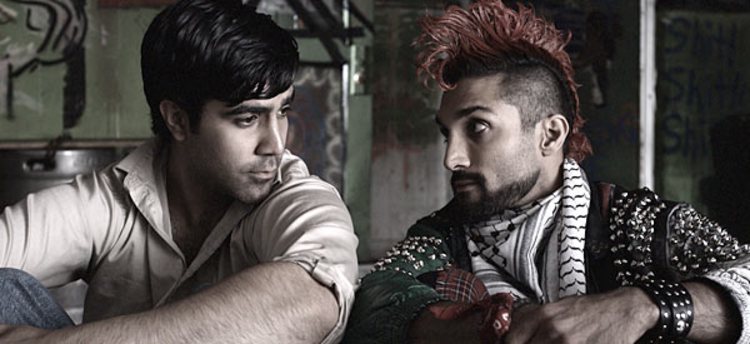
The rise of Taqwacore: from parking lots to Park City
Los Angeles Times | Brand X Daily - January 28, 2010
In the beginning, there was the Word. Then came the Music. After that, the Phenomenon caught fire, and that’s when things got really interesting.
If that all sounds a bit mythical, it’s because it kind of is.
Originally imagined as a fictional world of living on the edge, Muslim punk rockers in Michael Muhammad Knight’s 2003 novel, “The Taqwacores,” Taqwacore has since evolved into an honest-to-goodness, real-life, fight-the-power scene, replete with young and charismatic activists, artists and Punk — the only appropriate soundtrack to any decent rebellion.
Groups like the Chicago doom-crust band Al-Thawra and Boston-based ska-punkers the Kominas are rapidly gaining attention, as evidenced by August’s Los Angeles Times feature. Omar Majeed’s documentary about the subculture, “Taqwacore: The Birth of Punk Islam,” made Spin magazine’s “Best Music Documentary” list of 2009, and “The Taqwacores,” Eyad Zahra’s feature film adaptation of the novel, premiered this week as an official competitor at the Sundance Film Festival. (For more on that, check out the post at the LA Times’ 24 Frames blog.)
Knight, a Rochester, N.Y., native who converted to Islam in his teens and then struggled with an inability to reconcile his faith with his inner Punk, coined the book's title from the Arabic word "Taqwa," which means piety or God-fearing, and “hardcore,” a subgenre of late-70s punk rock. The novel, which he handed out for free in parking lots before finding a publisher in 2004, resonated so strongly with young Muslims dissatisfied with traditionalists in their own communities and clichés foisted on them by outsiders that it became something of a manifesto.
A reluctant guru at best, Knight is uncomfortably aware of the role that has been painted of him in the media as leader of the so-called movement. “That’s just scary to me,” Knight said. “The whole point is there’s not supposed to be a guru. There’s not supposed to be someone’s shadow you’re in.”
Other misconceptions include that of Taqwacore being specifically an Islamic construct. “Everyone assumes we’re all Muslim,” said Marwan Kamil, lead singer of Al-Thawra. “We’re just a bunch of kids that feel outside, like ‘the other.’ And because of that a lot of different people can identify.”
Another problem is the assumption that all Taqwacores are punk rock boys. “The bands always get reported on, but it’s not just a band scene, and most of us are girls,” said blogger Tanzila Ahmed. And there’s no specific fight, except that against any element of society that would seek to squelch freedom of expression, artistic or otherwise. “Taqwacore is a loose configuration of artists who want to rebel in their own way against any form of fundamentalism, Islamic or not,” added Mila Aung-Thwin, whose company EyeSteelFilm produced Majeed’s documentary, soon to be distributed by Lorber Films.
Members of the unofficial but close-knit Taqwacore community call themselves Taqx, coined by photographer Kim Badawi, whose arresting photographs of the scene compellingly capture the raw energy of the early days, or “scenesters,” as described by Ahmed. Taqx are writers, photographers, musicians and just plain old fans. And like any self-respecting punks, they bristle at attempts by the media to label them as anything so organized or simplistic as a movement or group. Taqwacore is more about community, friendships and “being punk in terms of attitude and individuality,” said Shahjehan Khan, guitarist for the Kominas.
All the same, the Taqwacore crew is known for outrageous behavior and thumbing their collective nose at rules, fundamentalism and the constraints of polite society. Some of their more infamous shenanigans include crashing (and getting booted from) the Islamic Society of North America’s 2007 convention as well as a staging a faked wrestling match between Knight and Ibrahim Hooper, spokesperson for the Council on American-Islamic Relations (CAIR). As Knight put it, “Punk is not about being diplomatic.”
When contacted for comment, Hooper said that CAIR supports “diversity and self-expression” of everyone in the Islamic community, with the caveat that they “hope it stays within Islamic moral and religious guidelines.” As for the staged wrestling match in which he did not participate, and which blew up on YouTube, he was unfazed.
“I’m the spokesperson for a public organization, so I’m fair game,” Hooper said. “I’m used to it. That’s life in the big city.”
Like the Grunge scene in the '90s, commercialization of all things Taqwacore has already begun. Seattle designer Niilartey DeOsu was one of many Taqwacore fans who made the trek to Park City, Utah, with the difference that he didn’t only want to see the film and hang with the scenesters — he also wanted to clothe them.
Knight admitted that his background in the punk scene automatically aligns him against anything to do with fashion, but allowed that, “if someone relates to Taqwacore and wants to bring it into their world, it would be wrong of me to put that down. Taqwacore needs to be as formless and indefinable as possible. I don’t own it.”
It’s anyone’s guess what’s next: The films are both awaiting distribution dates, and none of the bands have been signed to a major label yet. But the sense is that this tiny, fierce scene called Taqwacore will only continue to strengthen and grow.
“The mother ship is taking off,” said Majeed, laughing.
-- Melissa Henderson
